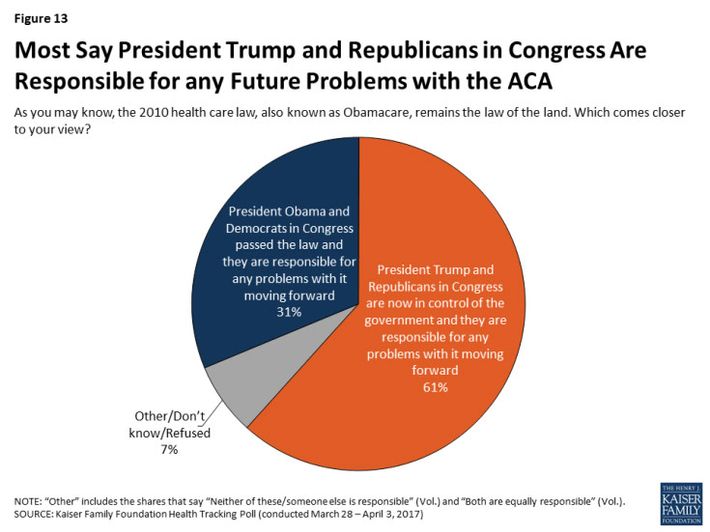
On Monday, the Department of Health and Human Services told the New York Times it intended to continue making “cost-sharing reduction” payments, which compensate insurance companies that cover low-income customers in the exchanges established by Obamacare. Eliminating the payments — which cost the government about $7 billion a year — would make premiums spike by about one-fifth, or cause insurers to get out altogether. House Republicans sued to stop the payments during Obama’s presidency, as part of their totalistic campaign to destroy the law. Now, faced with the prospect that such a destruction would unfold on the GOP’s watch, the Trump administration was indicating it would let the payments continue. “The precedent is that while the lawsuit is being litigated, the cost-sharing subsidies will be funded. It would be fair for you to report that there has been no policy change in the current administration,” Health and Human Services wrote the Times.
The next day, however, HHS rescinded its statement. In its place, it issued a communiqué which differed from the old one not only in substance, but in style: The updated HHS position rejected the payments and expressed its reasoning using the crass, zero-sum logic and pidgin-English, populist diction favored by the president himself. “We have not been contacted by Democrats to help save Obamacare, perhaps because they consider Obamacare to be a losing cause. Democrats need to help solve this failed Obamacare plan,” explained an HHS spokesperson. It read as if the bureaucracy of a modern, industrialized government had been captured by hackers communicating via Google Translate.
And indeed, it soon emerged that Trump had personally dictated the new statement in a fit of anger. As he subsequently revealed in an interview with The Wall Street Journal, he plans to use the payments as ransom to compel the Democrats to agree to his terms. “Obamacare is dead next month if it doesn’t get that money,” Trump told the Journal. “I haven’t made my viewpoint clear yet. I don’t want people to get hurt … What I think should happen and will happen is the Democrats will start calling me and negotiating.”
So, now — assuming that Trump understands what he is saying and will stick to it, which can never be assured about any stance he takes — Washington has settled in for a hostage standoff. Such episodes have become familiar in American politics. In a normal political negotiation, the two sides disagree about what policies are helpful or harmful. In a hostage-style negotiation, on the other hand, the two sides agree that a particular policy is harmful, and one side threatens to allow it, out of the belief that it can exploit the other side’s greater concern for the public welfare, in order to extort unilateral concessions. In recent years, as the Republican Party has radicalized, it has grown increasingly prone to hostage-style bargaining. Trump’s own obsession with dominance makes him especially attracted to hostage-taking. (Recall his refusal during the primary to commit to endorsing the party nominee, explaining that he needed to use the threat of hurting the party as “leverage.”)
There are, however, several reasons to doubt that Trump will collect on his ransom. The first is that, while terrorists and other criminals generally operate outside of a public-opinion framework, elected officials operate within it. There is not a long record of voters reelecting public officials who openly threaten them with harm. Polls have shown that the public expects Trump and his Republican majority to make Obamacare work:

If the exchanges collapse, the public backlash will redound to the benefit of the opposition party. Democrats may have a strong humanitarian rationale for preserving the system, but their political interest runs in exactly the opposite direction. Trump is threatening Nancy Pelosi and Chuck Schumer to meet his demands or else he will give them a majority in Congress.
What’s especially absurd is that it’s not even clear what Trump is demanding. His putative ransom is that Democrats “start calling me and negotiating.” But Democrats have stated all along their willingness to negotiate over strengthening the Affordable Care Act. What they’ve opposed are plans to repeal the law, or to use it as a mechanism to finance tax cuts for the rich at the expense of coverage for the poor. There are easy fixes to the problems facing some of the state exchanges — Sarah Kliff shows how Alaska did it — but Trump could get Democrats to vote for that sort of thing without a threat.
So what does Trump want? Suppose Pelosi and Schumer walk into the Oval Office, palms upraised, and agree to meet all of Trump’s demands if he promises to let the exchanges live a little longer. Does he think he can get Democrats to vote for some version of his American Health Care Act, a bill that has been polling at 17 percent? That they’ll throw millions of people off their insurance, in order to keep some other people from losing insurance?
Any health-care negotiation between Democrats and Trump would quickly run into the same barrier that foiled the negotiations between Republicans and Trump: The president’s utter ignorance of policy makes it impossible for him to agree to, let alone propose, anything of substance. Trump agrees with whoever he speaks with last, and speaks with lots of people who disagree with each other. Trump couldn’t close deals with politicians who agree with him. It’s hard to imagine him closing deals with politicians who don’t.
The Obamacare exchanges are economically stable. They face a threat from massive policy uncertainty emanating from Washington; it will take at least some managerial proficiency to assure jittery insurers that the exchanges are also politically stable. Trump is threatening to kill Obamacare through naked malevolence. But the real danger is that he’ll kill it through incompetence.






























